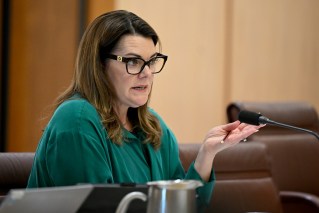Dreyfus on the brink of a deal on corruption commission, as Dutton plays his hand

The government is on the brink of securing support for legislation establishing a national anti-corruption commission on Monday after confirming that third parties will potentially be subject to its investigations.
With the bill scheduled for introduction on Wednesday, there were positive indications of support from both the Coalition and the crossbench, particularly after its ability to investigate third parties was confirmed.
“The commission will be able to investigate a corruption issue that could involve serious or systemic conduct by any person that could adversely affect the honesty or impartiality of a public official,” Attorney-General Mark Dreyfus said in Parliament.
Deal’s about details
Zoe Daniel, the independent MP for Goldstein who has been engaged in consultations over the shape of the agency and who asked the question of Mr Dreyfus on Monday, welcomed his response – but sounded a note of qualification about other aspects of the commission’s design.
“This is a good sign,” Ms Daniel said.
“Now we need to see the details as well as assurances that adequate whistleblower protections will be in place when the national anti-corruption commission begins to operate; that sufficient funding is guaranteed, and that there is proper parliamentary oversight.”
Independent MP Helen Haines said on Monday night the bill had been “10 years in the calling for”, with almost all of the running coming from the crossbench.
“I’m very encouraged by what I’ve heard the Attorney-General say thus far on the legislation,” she told 7.30.
“Fundamentally the design principles put forward align very closely with those that I had in my Australian federal integrity commission bill.
“Those really important issues like broad jurisdiction, a good definition of corruption, retrospectivity, one set of rules for all – they’re going to be there.”
Ms Haines said she had concerns and had sought assurances from Mark Dreyfus on matters such as statutory oversight, budgetary independence and third parties.
“I’m encouraged by what the Attorney’s told me about those things,” she said.
The New Daily understands that the commission will be empowered to investigate both illegal actions and those which are corrupt but do not breach the letter of the law, and launch inquiries of its own initiative; these were two key sticking points identified by crossbench MPs.
Another key point of contention is the more general question of how wide the commission’s focus will be; this can only be determined by examination of the legislation’s 300 pages of fine print.
The government had been consulting with both sides of the aisle on the provisions of the integrity bill in the hope that it might secure universal support for its passage.
Dutton believes
In the upper house the government needs the support of the Greens and at least one other to pass the bill, unless it can secure the support of the Coalition.
Opposition Leader Peter Dutton suggested on Monday that such an outcome was more than possible.
“I believe that there will be a bill that we can support,” Mr Dutton told the ABC’s Four Corners program.
But in comments reminiscent of Liberal critiques of the New South Wales Independent Commission against Corruption’s public hearings that forced the end of the reign of Gladys Berejiklian, he warned against “show trials”.
“I don’t want people’s lives destroyed,” he said.
Mr Dutton said that his point about public hearings was one that the “government concedes”.
“I think the other difficulty that we had was some of the breadth, and I think that’s being addressed by the government as well,” he said.
“We’re working constructively with the government.”
Crossbench concerns
A statement from crossbench MPs released on Monday said the commission should be able to investigate matters of “grey corruption”, and have guaranteed funding that protected it from being neutered by budget cuts.
“We have worked constructively with the government in consultations on the bill and intend to continue in that manner as it is considered by committee and debated in both houses,” the statement said.
“We have been raising our detailed concerns with the government for many months now in a good faith attempt to have them addressed in a timely way.”
The New Daily understands the bill will be retrospective and will give the agency a broad legislative remit to investigate serious or systemic corruption, a test it will apply independently of the government.
Mr Dreyfus said in question time the issue of whether so-called pork barrelling, or the skewing of grants along party political lines or for partisan political purposes, will be investigated shall remain a matter for the commission.
Similarly, it will be up to the commission to determine whether to hold public hearings.
A guiding test will be whether the acts are serious enough to warrant the attention of the new national investigative body or are already covered by existing law enforcement agencies.
The NSW ICAC receives 3000 complaints a year, about 50 of which are investigated and about seven of which result in public hearings.
The bill will be released in draft form after a Labor caucus meeting on Tuesday, if it receives endorsement.








